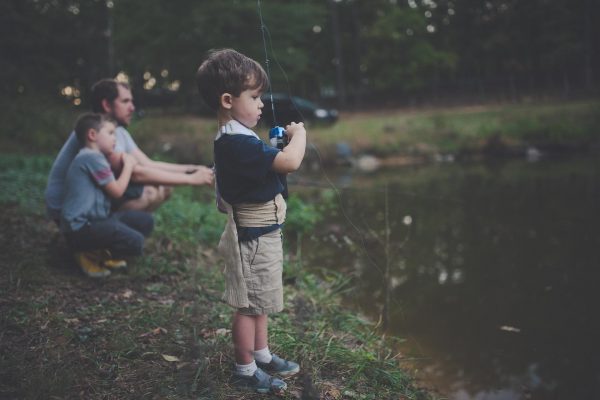Over the last couple of years which have been dominated by the pandemic, we’ve all had to put many things on hold— and wait. Recently, when thinking about waiting, I remembered a short paper I had written in 2014 during my psychoanalytic training at IPI. Three times a year, we were asked to write a short, informal paper about anything related to theory or technique. Writing, as well as listening to my classmates’ papers, was a delightfully fun part of the training. Becoming a psychoanalyst involves many different kinds of learning — from reading about theory and technique, class discussions, supervision, our own analysis and especially from our analysands. And for me, poetry has always offered clarity and an additional way to understand a concept. Poetic images often stimulate our receptivity, evoke a new kind of awareness, and illuminate the meaning of complex ideas, helping us to grasp their essence.

What follows is my 2014 paper, entitled “Thoughts on Waiting and Fishing”.
I was recently driving in the car on a Saturday morning, listening to one of my favorite radio shows, “Wait, Wait… Don’t Tell Me!” The moderator poses questions based on the week’s news, as humorists on the panel, or the call-in guest, compete to provide the correct answer. During that show, my mind drifted, and I found myself wondering about possible topics for this paper. I became curious. Why thoughts about the paper now? Ah……the word “wait”.…it carries weight in my developing psychoanalytic mind.
Although aiming for negative capability, when that is difficult I can find myself in some version of “Wait, wait….don’t tell me”, communicating in an indirect way, “Wait, I know the answer”, or “I know where you are going”, or “Wait, don’t tell me, I find that difficult to bear”.
Being comfortable with waiting brings to mind Winnicott’s description of the early mother/child experience, in which the baby takes time to nurse. The baby sucks, then stops, then starts again when ready, with the sense that the mother is in-sync, because she waits. In this description of waiting, the verb has no object—the mother just waits. There is no sense that the mother is waiting for the baby, which would imply an expectation of how the baby’s feeding should proceed.
During this period of thinking about analytic waiting and writing this paper, I opened a new book of poems, and in a welcomed coincidental moment there was one that caught my eye—“Fishing with My Father and the Craft of Poetry”, by Ralph Culver. This new inspiring image of waiting begins:
“Holding poles over the water,
hours of catching nothing or not much,
and throwing back what we did catch.”
These first lines paint an image of two people with perseverance, and patience, being involved in an activity for the enjoyment of the process, rather than a sense of productivity. They are fully engaged, yet are not in a hurry, and much of the time it doesn’t matter to them if they catch anything.
A fisherman walks quietly along the water not knowing if there will be anything to catch. Following the stream and his intuition, he looks in every pool, trying not to disturb the fish as he comes near. Each place he stops is an opportunity, but he can’t leap at it. He curiously studies their actions and patterns. He stands out of sight and stays still, in a state of readiness, but not over zealousness, all the while thinking and waiting for the right time. Based on his scientific skills and his artistic ability to “read the water”, he casts the line and he waits. There may be a nibble of interest, even several, or none. Fishing for hours, sometimes finding nothing, the fisherman trusts that failures are part of the process. And, a fisherman is taught that if the fish aren’t biting, then he needs to rethink what he is feeding them. As the poem describes, it can feel at times like nothing is happening, yet faith and patience grow after hours of practice. The poem continues:
“What the hell was that about, anyway?
And yet today I have this patience
for things that drive some people crazy:
standing in line at the supermarket,
waiting for some fool blowhard to stop gabbing,
searching for a coat button in the snow.”
The last few lines of the poem point to the conviction and devotion that are common in fishermen, also Winnicott’s nursing mothers and skilled psychoanalysts:
“The finely honed conviction that beneath
this nothing is a deeper, richer nothing.
Consecrating myself to the silence, and then
to what interrupts the silence.”
This poem uses the word consecrating, which is usually used in religious writings. To consecrate is to make sacred, and in the broad sense of the word, to regard something or someone with great respect, devotion and dedication. When practicing psychoanalysis, we respectfully wait in order to give the analysand and ourselves the sacred space to fish around in our unconscious minds and to offer a thought, or not—and trust that something will emerge from our depths.
 Michele Reed, M.S.W, is a clinical social worker and psychoanalyst practicing in Waterbury, Vermont. She has been a faculty member at IPI since 2011. In 2018, she graduated from IPI’s International Institute for Psychoanalytic Training, where she has been a faculty member since 2020.
Michele Reed, M.S.W, is a clinical social worker and psychoanalyst practicing in Waterbury, Vermont. She has been a faculty member at IPI since 2011. In 2018, she graduated from IPI’s International Institute for Psychoanalytic Training, where she has been a faculty member since 2020.

